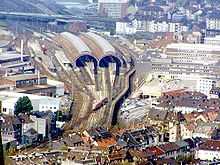Hagen Hauptbahnhof
| Hagen Hauptbahnhof | |
|---|---|
 The station hall | |
| Operations | |
| Category | 2 |
| Type | Through station |
| Platforms in use | 16 |
| Daily entry/exit | 30,000 |
| DS100 code | EHG |
| Station code | 2457 |
| Construction and location | |
| Opened | 1848, rebuilt 1910 |
| Style of architecture | Baroque Revival |
| Location | Hagen |
| State | North Rhine-Westphalia |
| Country | Germany |
| Home page | www.bahnhof.de |
| 51°21′44″N 7°27′39″E / 51.362178°N 7.460935°ECoordinates: 51°21′44″N 7°27′39″E / 51.362178°N 7.460935°E | |
| Route information | |
| |
| List of railway stations in North Rhine-Westphalia | |
Hagen Hauptbahnhof is a railway serving the city of Hagen in western Germany. It is an important rail hub for the southeastern Ruhr area, offering regional and long distance connections. The station was opened in 1848 as part of the Bergisch-Märkische Railway Company's Elberfeld–Dortmund line and is one of the few stations in the Ruhr valley to retain its original station hall, which dates back to 1910.
History

.jpg)
The original Elberfeld–Dortmund trunk line of the Bergisch-Märkische Railway Company was competed in1848/49 linking Hagen to the rapidly expanding Prussian railway network. This led to Hagen quickly becoming an industrial city based steel and metal production. After the opening of the Ruhr–Sieg railway to Siegen via Altena in 1861 the city also became an important railway junction.[1]
The Baroque Revival entrance building, opened on 14 September 1910, was built of brick and partly covered with sandstone. It survived bombing during the Second World War, although not completely, in contrast to other stations in the Ruhr area, so it can be admired today. A stained-glass window called The Artist as Teacher of Trade and Industry (German: Der Künstler als Lehrer für Handel und Gewerbe) by Jan Thorn Prikker was installed above the entrance by Karl Ernst Osthaus in 1911.[1]
Also preserved is a two-span train shed designed by Stephany from 1910. It was restored in the 1990s and is heritage-listed as an important example of a steel-constructed hall developed in the late 19th century. It is the only remaining station with a "traditional" platform area in Westphalia and the Ruhr region and one of a few of its kind in Germany. The heavy Anglo-American bombing raids in World War II on Hagen did not destroy it, unlike many other railway stations in the Ruhr.[1]
The station has points and overtaking tracks connecting to the two main platforms in the train shed. This allows up to four (short) trains to operate from each of these two-edged platforms. This has the disadvantage that passengers may sometimes be required to walk long distances.
The interior of the station was painstakingly restored from the autumn of 2004 to May 2006. Thus, the barrel vault over the concourse has been reconstructed, restoring some of its old lustre and details, including Thorn Prikker’s stained-glass window, are now illuminated by daylight and are again clearly visible. This work was carried out for the 2006 World Cup of football at a total cost of €1.2 million.
The Hagen Hauptbahnhof is a listed building and is part of the The Industrial Heritage Trail (Route Industriekultur).[1]
Rail services
The station serves as an important link between long distance and commuter services; the InterCityExpress lines linking Cologne and Berlin call at the station as well as various InterCity and EuroCity services.
Hagen Hbf lies within the area of the Verkehrsverbund Rhein-Ruhr transport association and is served by several RegionalExpress and RegionalBahn lines as well as by two S-Bahn services of the Rhein-Ruhr S-Bahn network.
Long-distance
In long-distance passenger traffic the following Intercity and Intercity-Express services run through Hagen Hauptbahnhof:
| Preceding station | Deutsche Bahn | Following station | ||
|---|---|---|---|---|
towards Cologne Hbf or Koblenz Hbf |
ICE 10 | Hamm towards Berlin Ostbahnhof |
||
towards Munich Hbf |
ICE 31 | towards Kiel Hbf |
||
towards Basel SBB |
ICE 43 | towards Hannover Hbf |
||
towards Wien Westbf |
ICE 91 | towards Wien Westbf |
||
towards Passau Hbf |
IC/EC 31 | |||
towards Cologne Hbf |
IC 55 | towards Leipzig Hbf |
Regional trains
| Preceding station | Abellio Rail | Following station | ||
|---|---|---|---|---|
Wetter toward Essen Hbf |
RE 16 Ruhr-Sieg-Express |
Hagen-Hohenlimburg toward Siegen |
||
toward Essen Hbf |
RB 40 Ruhr-Lenne-Bahn |
Terminus | ||
| Terminus | RB 91 Ruhr-Sieg-Bahn |
Hagen-Hohenlimburg toward Siegen |
||
| Preceding station | Deutsche Bahn | Following station | ||
Ennepetal toward Aachen Hbf |
RE 4 Wupper-Express |
toward Dortmund Hbf |
||
Ennepetal toward Krefeld Hbf |
RE 7 Rhein-Münsterland-Express |
Schwerte toward Rheine |
||
| Terminus | RE 17 Sauerland-Express |
Schwerte toward Kassel Hbf |
||
Herdecke toward Dortmund Hbf |
RB 52 Volmetalbahn |
Hagen-Oberhagen toward Lüdenscheid |
||
| Preceding station | eurobahn | Following station | ||
Ennepetal toward Venlo |
RE 13 Maas-Wupper-Express |
Schwerte toward Hamm |
||
| Preceding station | Rhine-Ruhr S-Bahn | Following station | ||
toward Dortmund Hbf |
S 5 | Terminus | ||
toward Mönchengladbach Hbf |
S 8 | Terminus |
Notes
- ↑ 1.0 1.1 1.2 1.3 "Hagen Hauptbahnhof" (in German). route-industriekultur. Retrieved 7 September 2011.
External links
- "Track plan for Hagen Hauptbahnhof" (PDF) (in German). Deutsche Bahn. Retrieved 7 September 2011.
- "Hagen Hbf". NRW Rail Archive (in German). André Joost. Retrieved 7 September 2011.
| Wikimedia Commons has media related to Hagen Hauptbahnhof. |